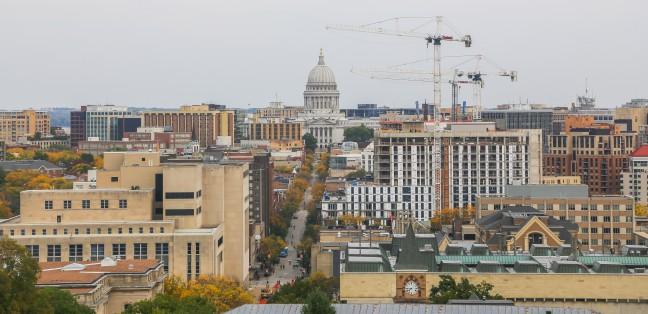This can’t be real, University of Wisconsin junior Najeeha Khan thought to herself.
Khan and likely millions of other Muslims around the country thought it must have been a joke when Republican presidential nominee Donald Trump announced in December 2015 that he would implement a ban on all Muslims entering the U.S.
But statements like these aren’t something new in the Trump campaign, as the Republican nominee has made headlines for numerous other controversial remarks directed toward marginalized groups, such as Mexican immigrants, women and the disabled.
While the rhetoric he has employed has changed the national political landscape, certain local governments are standing up to the contentious comments made against marginalized and underrepresented groups.
Just a few weeks shy of Election day, Dane County Board unanimously passed an anti-hate, anti-bias resolution Oct. 20 geared toward affirming their commitment to the Muslim community.
The opinion resolution is largely meant to re-affirm Dane County’s commitment to civil and human rights, Supervisor Hayley Young, District 5, said.
When Young introduced the resolution at an Oct. 6 meeting, Young said she wanted to publicly state what Dane County’s values are.
“The role of local government is to make everyone feel welcomed in their communities,” she said at the meeting.
With the resolution, Khan said she felt the Dane County Board was acknowledging Muslims as part of their community.
Khan said these resolutions also make her feel more comfortable reaching out to her government and reporting something.
“It felt really good because [the resolution] showed they were taking this issue seriously and recognizing that this is something the Muslim community is worried about,” Khan, who serves as UW’s Muslim Student Association president, said.
Likewise, Omer Arain, a UW junior and MSA member, said he was appreciative of the resolution, and he felt Dane County was acknowledging a divisive issue.
After Young introduced the resolution, she reached out to UW’s MSA to ask for any recommendations or changes to the language used. That inclusivity, Khan said, was “really nice” and showed that Dane County was going out of its way to be sensitive to the issue.
As elected officials, members of the board have an increased responsibility to call out and condemn hateful and often violent rhetoric used toward Muslims, the resolution said.
Though Trump in December shifted from imposing a total ban on Muslims to “extreme vetting” of refugees — particularly those from Syria — his continued rhetoric surrounding Muslims has still been troubling for people like Arain. In the second presidential debate, Trump encouraged all Muslims to “report when they see something going on.”
Trump asked, so Muslims responded with #MuslimsReportStuff.
"Hello, I'd like to report a dangerous racist misogynist demagogue on my TV…yes, I'll hold." #MuslimsReportStuff #Debates
— Zainab Chaudary (@chaudary_zainab) October 10, 2016
https://twitter.com/EmanHAly/status/785309405420150784
Arain said Trump’s request was a way of assuming that all Muslims are associated with terrorism.
“I don’t see anything,” Arain said. “Not all Muslims are actually related to these people who are committing acts of terror.”
Similarly, Khan had nothing to report.
In making these types of accusations, Khan said it leads people to assume there is automatically something intrinsically wrong with Muslims.
At a time when 43 percent of U.S citizens harbor some degree of prejudice toward Muslims, according to a December 2015 Gallup poll, it can sometimes be uncomfortable for Muslim students on campus.
On campus, hate and bias incidents have nearly tripled in the first half of 2016 compared to the last half of 2015.
For students like Khan, who wear the hijab, she often is put in the position where she is expected to be a “representative” for her people when speaking on certain issues such as the political climate, election or even Islamophobia.
“I think one interesting dynamic that plays out is that I can’t hide,” Khan said. “If in the moment I don’t feel safe with my Muslim identity, it’s not something I can’t put away. I’m OK with [wearing the hijab] because I made this choice. But because of that, I’m expected more and more to be a representation.”
In class, she said she feels that because it’s easy to identify her as Muslim, she is automatically expected to say something when certain issues come up. While she said she doesn’t mind it, others might have a problem with being expected to speak up all the time.
Through this resolution, Young hopes to foster dialogue and create more cohesion between local government and its community so that every group in Madison feels comfortable expressing their concerns.
“I think this resolution is going to start conversation,” Young said. “One opinion is not going to do something by itself, but it’s a good starting point.”


